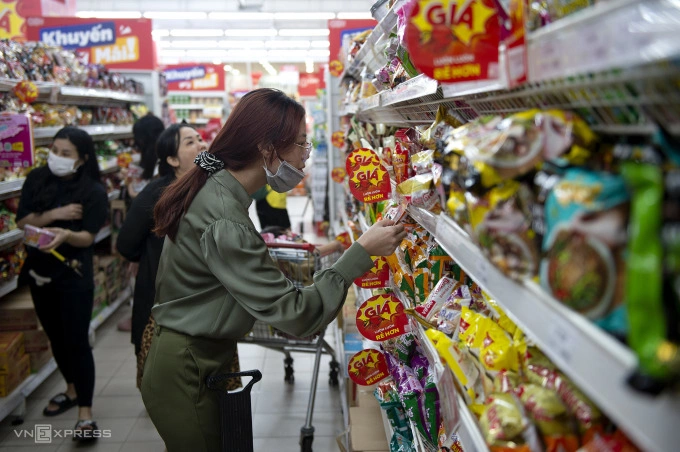Edition: International | Vietnamese
© Copyright 1997 VnExpress.net. All rights reserved.
Thu Ha of Hanoi’s Hoai Duc District plans to pay off the VND100 million (US$3,900) remaining of her home loan before the Lunar New Year in January 2025 and bolster her rainy day fund.
She received a raise last month but has maintained her commitment to saving.
"My family does not eat out or buy snacks unless it is for special occasions, so we save nearly VND2 million (per month) more than before," she said.
A survey in the third quarter by market research firm Nielsen IQ found that Vietnamese consumers are more optimistic about the country's economic outlook and their financial situation.
Some 45% said the economy is not in recession, a 3 percentage point increase from the first quarter, while 67% said their finances have steadily improved from a year ago.
But instead of splurging, they are saving even more than before, the firm said.
Some 83% said they have started saving money and 72% said they want to save up for long-term goals, both up 6 points from the same period last year.
Linh Duong, senior manager for consumer research at Nielsen IQ, said many people are saving because they feel the prices of groceries and other essentials have increased over the last six months.
Thao Huynh, head of Vietnam industry research at Nielsen IQ, said many are creating emergency funds for use in case of illness, with half the respondents saying rising healthcare costs is their top concern.
 |
|
Consumers shop at a supermarket in HCMC on June 18, 2023. Photo by VnExpress/Thanh Tung |
The two most common saving methods among Vietnamese people are adjusting their lifestyles and shopping habits, and they keep the money in banks.
Some 73% of those surveyed said they only buy necessities while 47% choose to spend more time at home.
Linh said: "Working from home helps save commuting costs. People are also more careful about recreational activities."
Growth of retail sales of goods and services slowed to 8.5% year-on-year in the third quarter from 9.8% in 2023, according to the General Statistics Office.
Meanwhile, bank deposits rose by 6% from the end of 2023 to VND6.92 quadrillion in August, according to the State Bank of Vietnam.
But analysts at Nielsen IQ said belt-tightening does not mean consumers are willing to pay for low-quality products.
Many still buy costly food, such as natural or organic products, since they are concerned about healthcare costs, they said.
Lifestyle diseases such as diabetes, high blood pressure, heart disease, and stroke become more common as people age, and so they prefer prevention to treatment.
In addition to focusing on healthy options, businesses can also distribute their products through e-commerce platforms, which, unlike traditional retail channels, are seeing an increase in demand.
The survey found that 61% of consumers sought to save money by shopping online.
The 2024 e-Conomy SEA report by Google and Temasek and consultancy Bain & Co has forecast Vietnam's e-commerce market to reach US$22 billion this year, up 18% from 2023.
Linh said many people have turned to online shopping to get more discounts.
E-commerce giant Shopee, for example, reported that it received six to seven times the usual number of orders during its massive Nov. 11 sale.
Lazada, another e-commerce platform, said online shopping demand would grow further at the end of the year during the peak season.
Doan Trang Ha Thanh, Lazada’s chief operating officer, expected traffic and gross merchandise value to shoot up since the platform plans to run plenty of discounts, promotions and livestreams.